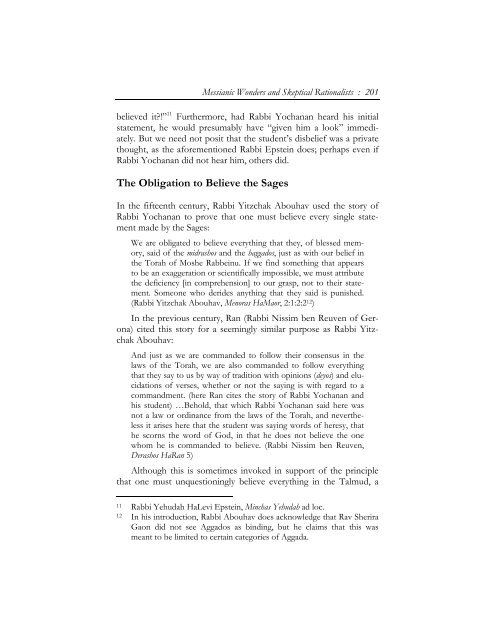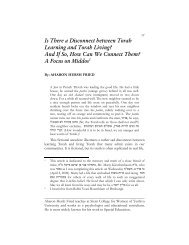Messianic Wonders and Skeptical Rationalists - Hakirah.org
Messianic Wonders and Skeptical Rationalists - Hakirah.org
Messianic Wonders and Skeptical Rationalists - Hakirah.org
Create successful ePaper yourself
Turn your PDF publications into a flip-book with our unique Google optimized e-Paper software.
<strong>Messianic</strong> <strong>Wonders</strong> <strong>and</strong> <strong>Skeptical</strong> <strong>Rationalists</strong> : 201<br />
believed it?!” 11 Furthermore, had Rabbi Yochanan heard his initial<br />
statement, he would presumably have “given him a look” immediately.<br />
But we need not posit that the student’s disbelief was a private<br />
thought, as the aforementioned Rabbi Epstein does; perhaps even if<br />
Rabbi Yochanan did not hear him, others did.<br />
The Obligation to Believe the Sages<br />
In the fifteenth century, Rabbi Yitzchak Abouhav used the story of<br />
Rabbi Yochanan to prove that one must believe every single statement<br />
made by the Sages:<br />
We are obligated to believe everything that they, of blessed memory,<br />
said of the midrashos <strong>and</strong> the haggados, just as with our belief in<br />
the Torah of Moshe Rabbeinu. If we find something that appears<br />
to be an exaggeration or scientifically impossible, we must attribute<br />
the deficiency [in comprehension] to our grasp, not to their statement.<br />
Someone who derides anything that they said is punished.<br />
(Rabbi Yitzchak Abouhav, Menoras HaMaor, 2:1:2:2 12 )<br />
In the previous century, Ran (Rabbi Nissim ben Reuven of Gerona)<br />
cited this story for a seemingly similar purpose as Rabbi Yitzchak<br />
Abouhav:<br />
And just as we are comm<strong>and</strong>ed to follow their consensus in the<br />
laws of the Torah, we are also comm<strong>and</strong>ed to follow everything<br />
that they say to us by way of tradition with opinions (deyos) <strong>and</strong> elucidations<br />
of verses, whether or not the saying is with regard to a<br />
comm<strong>and</strong>ment. (here Ran cites the story of Rabbi Yochanan <strong>and</strong><br />
his student) …Behold, that which Rabbi Yochanan said here was<br />
not a law or ordinance from the laws of the Torah, <strong>and</strong> nevertheless<br />
it arises here that the student was saying words of heresy, that<br />
he scorns the word of God, in that he does not believe the one<br />
whom he is comm<strong>and</strong>ed to believe. (Rabbi Nissim ben Reuven,<br />
Derashos HaRan 5)<br />
Although this is sometimes invoked in support of the principle<br />
that one must unquestioningly believe everything in the Talmud, a<br />
11 Rabbi Yehudah HaLevi Epstein, Minchas Yehudah ad loc.<br />
12 In his introduction, Rabbi Abouhav does acknowledge that Rav Sherira<br />
Gaon did not see Aggados as binding, but he claims that this was<br />
meant to be limited to certain categories of Aggada.
















